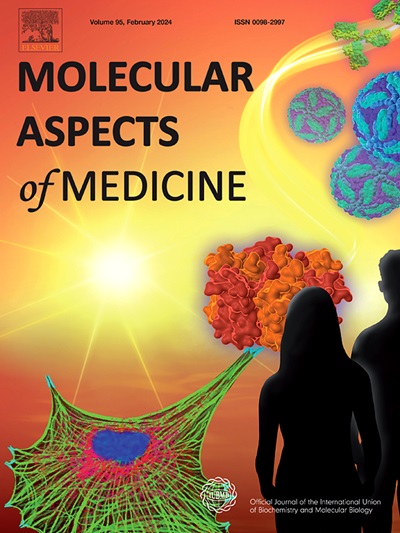肥胖介导的细胞功能障碍和脂肪细胞因子信号通路在骨关节炎发病中的意义
IF 10.3
2区 医学
Q1 BIOCHEMISTRY & MOLECULAR BIOLOGY
引用次数: 0
摘要
骨关节炎(OA)是一种以软骨退化、骨硬化和慢性低度炎症为特征的退行性关节疾病。衰老和损伤通过触发脂肪组织和其他来源的促炎因子的释放,在OA发病中起关键作用。肥胖和衰老损害内质网(ER)伴侣的功能,导致内质网应激、蛋白质错误折叠和细胞凋亡。肥胖还通过氧化应激诱导OA的线粒体功能障碍,破坏线粒体动力学,加剧软骨细胞损伤。这些因素导致炎症、基质失衡和软骨细胞凋亡。脂肪细胞是脂肪因子的主要来源,释放影响关节细胞的炎症介质。几种脂肪细胞因子在炎症的许多方面的调节中起着中心作用。脂联素和瘦素是两种最丰富的脂肪细胞因子,与OA进展密切相关。本文献综述表明,脂肪因子激活多种信号通路发挥下游作用,在肥胖诱导的OA中发挥重要作用。了解这个主要由脂肪细胞衍生的介质和肥胖介导的细胞功能障碍的快速增长的家族,可能对开发与肥胖相关的OA管理的新疗法具有重要意义。本文章由计算机程序翻译,如有差异,请以英文原文为准。

Implications of obesity-mediated cellular dysfunction and adipocytokine signaling pathways in the pathogenesis of osteoarthritis
Osteoarthritis (OA) is a degenerative joint disease characterized by cartilage degradation, bone sclerosis, and chronic low-grade inflammation. Aging and injury play key roles in OA pathogenesis by triggering the release of proinflammatory factors from adipose tissue and other sources. Obesity and aging impair the function of endoplasmic reticulum (ER) chaperones, leading to ER stress, protein misfolding, and cellular apoptosis. Obesity also induces mitochondrial dysfunction in OA through oxidative stress and disrupts mitochondrial dynamics, exacerbating chondrocyte damage. These factors contribute to inflammation, matrix imbalance, and chondrocyte apoptosis. Adipocytes, the primary source of adipokines, release inflammatory mediators that affect joint cells. Several adipocytokines have a central role in the regulation of many aspects of inflammation. Adiponectin and leptin are the two most abundant adipocytokines that are strongly associated with OA progression. This literature review suggests that adipokines activate many signaling pathways to exert downstream effects and play significant roles in obesity-induced OA. Understanding this rapidly growing family of mainly adipocyte-derived mediators and obesity-mediated cellular dysfunction may be important in the development of new therapies for obesity-associated OA management.
求助全文
通过发布文献求助,成功后即可免费获取论文全文。
去求助
来源期刊

Molecular Aspects of Medicine
医学-生化与分子生物学
CiteScore
18.20
自引率
0.00%
发文量
85
审稿时长
55 days
期刊介绍:
Molecular Aspects of Medicine is a review journal that serves as an official publication of the International Union of Biochemistry and Molecular Biology. It caters to physicians and biomedical scientists and aims to bridge the gap between these two fields. The journal encourages practicing clinical scientists to contribute by providing extended reviews on the molecular aspects of a specific medical field. These articles are written in a way that appeals to both doctors who may struggle with basic science and basic scientists who may have limited awareness of clinical practice issues. The journal covers a wide range of medical topics to showcase the molecular insights gained from basic science and highlight the challenging problems that medicine presents to the scientific community.
 求助内容:
求助内容: 应助结果提醒方式:
应助结果提醒方式:


